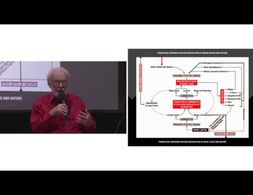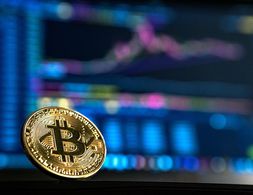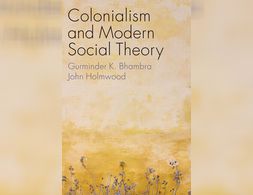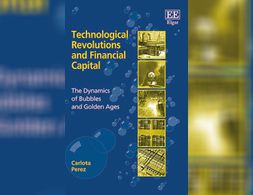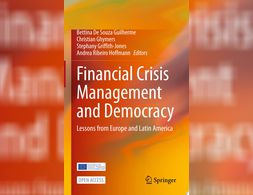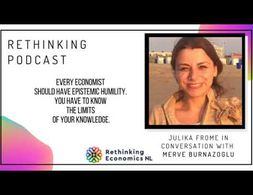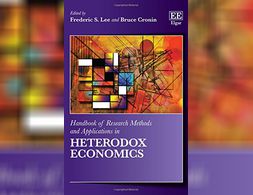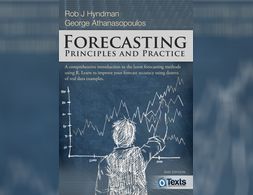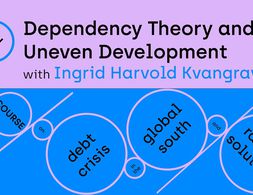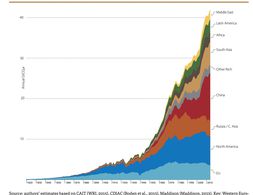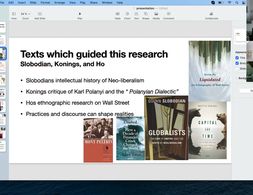✕
1136 results
This book presents recent thought on market efficiency, using a complex systems approach to move past equilibrium models and quantify the actual efficiency of markets.
The book provides an excellent comparative perspective on New Keynesian "New Consensus" economics and Post-Keynesian Economics at a beginner level. It also offers an interactive tool to understand how the economic models work, especially from a heterodox / pluralist perspective.
Marxist scholar David Harvey explains key concepts of capital from Marx. Applying Marx's analysis of capital to today's world, showing both the longevity and relevance of Marx's Capital, 150 years after its publication.
An overview of the last century economic theories asking what makes a heterodox economist. This lecture focuses on the evolution of the various academic traditions in economics. Lavoie presents his own typology for categorising seminal work within the post-Keynesian tradition while leaving space to acknowledge that categories are not binary, but can be used to help understand the different traditions, and how they have developed over the last decades.
This episode from Odd Lost podcast with financial analyst Zoltan Pozsar features a discussion on the potential long-term financial effects of the Ukraine-Crisis on dollar and the global currency system centered around it.
In this article, Rob Hoveman breaks down concepts like historical materialism and materialist analysis that are pivotal to understand Marx. He argues that abstractions are necessary for a concrete analysis of society that in turn should inform political practice.
The authors analyse the role and effects of the US dollar as factual global reserve currency. They demonstrate that a flight into the dollar creates adverse effects for the global economy as it represents a tightening of financial conditions.
The piece describes some of the effects that Nixon's decision to delink the dollar from gold in the 1970s had for the relationship between the IMF and its member states. A focus is on the negative effects of this change on societies in the Global South.
The article summarizes the effects that the war in Ukraine, the resulting economic sanctions as well as associated financial turbulences have for cryptocurrencies and their role in the global financial system.
Framing borders as an instrument of capital accumulation imperial domination and labor control Walia argues that what is often described as a migrant crisis in Western nations is the outcome for the actual crisis of capitalism conquest and climate change This book shows the displacement of workers in the global …
This text summarizes the content of the 2018 Nobel Prize winner W. Nordhaus. It is extended by some critical perspectives on this topic. The short dossier gives an overview of the most important texts we have read in the climate economics reading group.
Within the heterodox field one of the most active topics is related to the theory of economic growth and distribution This is a textbook for advance undergraduate and graduate students Throughout its 18 chapters Classical Neoclassical and post Keynesian models are developed Each chapter contains study problems and suggested readings …
This is an immensely important book for any student of social theory interested in understanding the colonial roots of a lot of contemporary thinking From a post colonial perspective Gurminder Bhambra and John Holmwood unpack how the emergence of modern society in the context of European colonialism and empire impacted …
Free, Fair & Alive is a foundational re-thinking of the commons, the self-organized social systems that human beings have used for millennia to meet their needs.
In this book, Carlota Perez develops her Neo-Schumpeterian concept of "techno-economic paradigms" which captures the patterns underlying the role of technological revolutions in economic development since the Industrial revolution.
This is an important contribution both to advancing theoretical and empirical understandings of African monetary sovereignty and to putting problems and possibilities relating to African monetary sovereignty on the political agenda This is of utmost importance given that these issues have largely not received much attention in contemporary discussions of …
This edited volume explores how dependency theories can be adapted and applied to understand limits and possibilities for development in Latin America and Europe It explores core periphery relations across different sets of countries specific mechanisms of dependency as well as the role of race and gender in dependency analysis …
Latin America and Europe can both learn from their respective experiences on crisis response and the distributive and democratic implications at national and regional level Democratic and distributive aspects of crisis response monetary financial economic policies and institutional reforms are key but have not been adequately addressed in the literature …
Marxian Political Economy focuses on the exploitation of labour by capital. The economy is not conceived as consisting of neutral transactions for exchange and cooperation, but instead as having developed historically out of asymmetric distributions of power, ideology and social conflicts.
These notes aim to clarify some basic features and implications of gross capital flows In the context of the 2007 08 Global Financial Crisis and the 2010 12 Eurozone Crisis trade imbalances and capital flows received a lot of attention from academics policymakers and the media However there is still …
This lecture is all about the challenge to include heterodox approaches into macroeconomics. After giving an overview of recent approaches to that problem Professor Michael Roos presents the theoretical framework of Complexity Economics as a means to combine behavioral aspects with macroeconomics.
Sabel and Zeitlin present the persistence of small firms in Europe against the rise of mass production and modern enterprises Their article starts by analysing how mass production can be considered a historical necessity for the classical view as it is a highly specialized structure where man and machine can …
From Marketisation to Armed Conflict Since 1991 nominally independent Ukraine has been in turmoil with the Orange Revolution and the Maidan protests marking its most critical moments Now its borders are threatened and the civil unrest and armed conflict continue to destabilise the country In order to understand these dramatic …
Rethinking Economics NL explores every month together with a new host the field of economics from a different perspective.
Despite the important methodological critiques of the mainstream offered by heterodox economics, the dominant research method taught in heterodox programmes remains econometrics.
Forecasting is required in many situations. Stocking an inventory may require forecasts of demand months in advance.
In this new book Smith returns to Solow s classic productivity paradox which essentially states that we can see automation everywhere like the spheres of leisure sociality and politics but not in the productivity statistics He examines why labor saving automation in the service age in the Global North has …
In this lecture, Branko Milanovic gives an overview of the concept of inequality as conceptualized within the classical school of thought.
A detailed introduction into dependency theory that rethinks its relevance to modern development challenges.
Feminist economics is a key component of the movement for pluralism in economics and one that has, to some extent, been acknowledged by the mainstream of the profession. It seeks to highlight issues which affect women because (it claims) they have not traditionally been recognised in a field dominated by men. On top of this, it seeks to carve out a space for women in the discipline, both for intrinsic reasons of fairness and diversity and because it means that women’s issues are more likely to be highlighted going forward.
The British historian, Adam Tooze, highlights how the climate crisis is not just an environmental or ecological problem but also a political economy challenge.
This lecture was held in the context of the a two day conference called Which pluralism for thinking about how to achieve a more sustainable and resilient economy The practices institutions and system logics of today s economy are not suitable for appropriately addressing fundamental human needs The climate crisis …
We use cookies on our website. Click on Accept to help us to make Exploring Economics constantly better!



